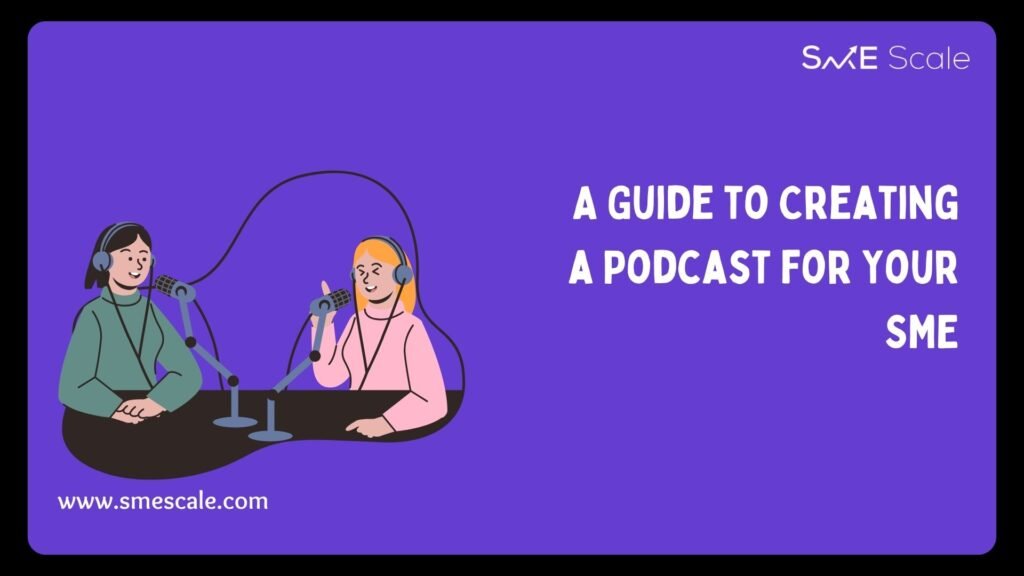A Guide to Creating a Podcast for Your SME: Strategies, Case Studies, and Psychological Insights

In today’s digital-first business landscape, podcasts have emerged as an increasingly popular tool for businesses, particularly small and medium-sized enterprises (SMEs), to engage with their audience, share expertise, and build brand awareness. Podcasts offer a direct, intimate way to connect with your target audience, allowing you to establish thought leadership, build trust, and expand your reach—all while maintaining a personal touch.
If you’re an SME looking to scale through digital channels, creating a podcast could be a game-changer for your marketing strategy. In this guide, we’ll explore the steps to create a successful podcast for your business, highlight a real-life case study, and dive into the psychology that makes podcasting such a powerful medium.
Why Podcasting Works for SMEs
Podcasting taps into several key psychological principles that make it an effective marketing tool:
Convenience: People love multitasking, and podcasts allow listeners to consume content while commuting, exercising, or even working. This convenience makes podcasting an accessible way to engage with your audience.
Connection: The personal nature of podcasting—hearing someone’s voice directly—creates a sense of intimacy and trust. This emotional connection is hard to achieve with other content formats like blogs or videos.
Storytelling: Humans are wired for stories, and podcasts offer an excellent platform for storytelling, whether it’s your brand’s journey, industry insights, or customer success stories. Engaging stories keep listeners hooked, making them more likely to become loyal customers.
Authority and Trust: When your SME hosts or participates in podcasts, it positions you as a thought leader in your industry. Sharing valuable insights and expert opinions builds credibility and trust with your audience.
Step-by-Step Guide to Creating a Podcast for Your SME
Identify Your Niche and Audience
Before starting a podcast, you must clearly identify your target audience. What are their pain points, and how can your expertise solve them? A successful podcast for an SME focuses on niche topics that are highly relevant to your industry. For instance, if you’re a marketing consultancy, focus on specific aspects like SEO trends, social media strategies, or digital advertising tips.
SEO Keywords: podcast for SME, create a business podcast, small business marketing podcast, SME marketing podcast.
Plan Your Content
A well-structured podcast requires careful content planning. Start by brainstorming topics relevant to your industry and audience. These can range from interviews with industry experts, customer success stories, behind-the-scenes looks at your business, or discussions on trending topics in your niche.
Keep the episodes concise and actionable. Most successful business podcasts run between 20 to 40 minutes, enough time to provide value without overwhelming listeners.
Invest in Quality Equipment
Sound quality is crucial for a podcast’s success. Invest in a decent microphone, headphones, and recording software. The good news is that you don’t need a professional studio setup—many successful podcasts are recorded from home with the right equipment.
Record, Edit, and Publish
Use editing software like Audacity or GarageBand to clean up your recordings, remove background noise, and add any intros or outros. Once your episode is ready, you can publish it on popular platforms like Spotify, Apple Podcasts, or Google Podcasts through a hosting service such as Anchor or Libsyn.
Promote Your Podcast
Promotion is essential to grow your podcast audience. Share new episodes across your social media platforms, include them in your email newsletters, and add podcast links to your website. Collaborating with guests or influencers is another great way to broaden your reach, as they will likely share the episode with their audience.
Real-Life Case Study: How “Tech Forward” Boosted Growth with a Podcast
Let’s take a look at a real-life example from SME Scale’s client, Tech Forward Innovations, a tech startup struggling with brand awareness in a competitive market. After discussing growth strategies, SME Scale recommended launching a podcast to establish thought leadership and connect with their target audience of startup founders and tech enthusiasts.
Step 1: Defining the Niche
Tech Forward chose to focus their podcast on “Scaling Your Startup with Technology,” which resonated with their target audience. They invited tech founders and experts to discuss the challenges and opportunities in scaling startups using innovative technologies.
Step 2: Engaging Content Strategy
Each episode focused on a specific pain point—such as overcoming tech barriers in scaling, funding strategies for tech startups, or using AI to optimize operations. They also featured real-life success stories from other startup founders, which resonated with listeners.
Step 3: Driving Engagement with Social Proof
Tech Forward implemented the psychological principle of social proof by sharing listener testimonials and highlighting successful partnerships with tech innovators in their podcast episodes. This not only built credibility but also encouraged other listeners to engage and participate.
Step 4: Consistent Promotion
Through consistent social media promotion, email newsletters, and collaborations with influencers in the tech space, Tech Forward steadily grew their podcast’s audience. Within six months, they saw a 50% increase in inbound inquiries, attributed directly to podcast listeners who trusted the brand’s expertise.
The Psychology Behind Successful Podcasting
Trust and Authority: By sharing expert advice and hosting industry leaders, Tech Forward positioned itself as a trusted authority. This fostered deeper connections with potential clients who felt they were receiving valuable, insider knowledge.
Engagement through Social Proof: Social proof—such as testimonials and guest appearances from respected figures—played a significant role in building credibility. Listeners are more likely to trust a brand when they see others endorsing it.
Emotional Connection: Through storytelling and personal interviews, Tech Forward created a sense of connection with their audience, fostering loyalty. As a result, listeners were more likely to follow up by visiting their website or inquiring about their services.
Final Thoughts: Why Your SME Should Start a Podcast
Podcasts are an accessible and highly effective way to build brand awareness, establish thought leadership, and engage with your target audience. With the right content strategy, consistent promotion, and a focus on storytelling, your SME can leverage podcasts to drive growth and connect with listeners on a deeper level.

